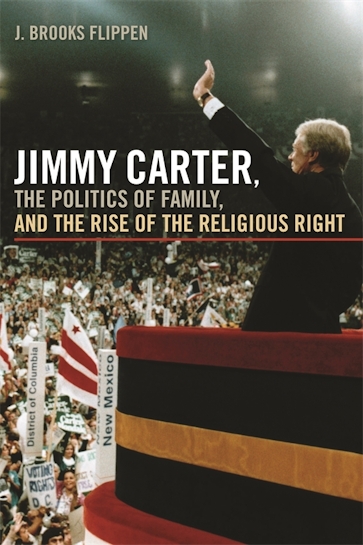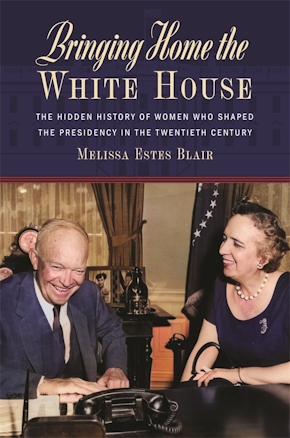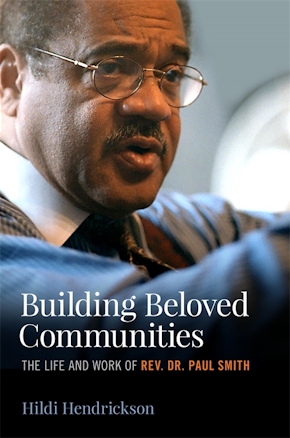Jimmy Carter, the Politics of Family, and the Rise of the Religious Right
Title Details
Pages: 456
Illustrations: 20 b&w photos
Trim size: 6.000in x 9.000in
Formats
Hardcover
Pub Date: 03/15/2011
ISBN: 9-780-8203-3769-2
List Price: $120.95
Paperback
Pub Date: 03/15/2011
ISBN: 9-780-8203-3770-8
List Price: $36.95
Related Subjects
HISTORY / United States / 20th Century
POLITICAL SCIENCE / Political Ideologies / Conservatism & Liberalism
Jimmy Carter, the Politics of Family, and the Rise of the Religious Right
Skip to
- Description
- Reviews
As Jimmy Carter ascended to the presidency the heir apparent to Democratic liberalism, he touted his background as a born-again evangelical. Once in office, his faith indeed helped form policy on a number of controversial moral issues. By acknowledging certain behaviors as sinful while insisting that they were private matters beyond government interference, J. Brooks Flippen argues, Carter unintentionally alienated both social liberals and conservative Christians, thus ensuring that the debate over these moral “family issues” acquired a new prominence in public and political life.
The Carter era, according to Flippen, stood at a fault line in American culture, religion, and politics. In the wake of the 1960s, some Americans worried that the traditional family faced a grave crisis. This newly politicized constituency viewed secular humanism in education, the recognition of reproductive rights established by Roe v. Wade, feminism, and the struggle for homosexual rights as evidence of cultural decay and as a challenge to religious orthodoxy. Social liberals viewed Carter’s faith with skepticism and took issue with his seeming unwillingness to build on recent progressive victories. Ultimately, Flippen argues, conservative Christians emerged as the Religious Right and were adopted into the Republican fold.
Examining Carter’s struggle to placate competing interests against the backdrop of difficult foreign and domestic issues—a struggling economy, the stalled Strategic Arms Limitation Talks, disputes in the Middle East, handover of the Panama Canal, and the Iranian hostage crisis—Flippen shows how a political dynamic was formed that continues to this day.
Flippen offers an exhaustive, highly documented, and fascinating account of how Jimmy Carter both helped inaugurate 'The Year of the Evangelical' in 1976 and ultimately lost the momentum of this movement to Ronald Reagan and the Republican Party.
—Choice
The strength of Flippen's book—and what makes it an important contribution to the spate of recent works on the seventies—is that it casts Carter as an active agent in the late 1970s conservative turn, even if he was not always an eager participant in developments he often could not control. . . . Flippen's work goes a long way toward clarifying Carter's role in the rise of the Religious Right.
—Journal of Southern Religion
Brooks Flippen makes a significant contribution to scholarship on the religious right movement and also the Carter presidency. With impressive use of original archival materials and interviews with key figures of the era, he presents a fascinating exploration and analysis of the intersection of the improbable rise of both the Religious Right and Jimmy Carter. Highly recommended to students and scholars of religion and politics and of the Carter era.
—Mark J. Rozell, Professor of Public Policy, George Mason University
J. Brooks Flippen has pulled together the disparate threads of a complex story to describe the role of 'family' issues in leading white evangelicals into the Republican Party. The combination of careful research, lucid prose and judicious analysis makes it an indispensable source for understanding political change over the last forty years.
—Dan T. Carter, Education Foundation Professor of History Emeritus, University of South Carolina
A clear, accurate, balanced account of both Carter's appeal in 1976 and his fall from grace in the eyes of the hyper-evangelicals. Flippen's treatment of the rise of the hot-button issues that fueled the Religious Right is a model of objective reporting with sensible analysis scattered throughout. I believe those on the political left and political right can read this book, learn from it, see its value, and appreciate its judiciousness.
—John B. Boles, William P. Hobby Professor of History, Rice University
A dramatic and detailed account of the mobilization of the Religious Right, its battles against feminism and gay rights, and Jimmy Carter’s futile attempts to placate all sides of the culture wars that exploded in the late 1970s. Flippen shows how the revolt of conservative Christians against Carter’s theological belief in the separation of church and state, not simply a religious versus secular divide, laid the foundation for the Republican embrace of ‘family values’ politics.
—Matthew D. Lassiter, author of The Silent Majority: Suburban Politics in the Sunbelt South
Jimmy Carter ran for president in the South as an evangelical. This bothered liberal opinion elsewhere but he needed the South to win. Once president he faced the more difficult task of satisfying both organized liberal and evangelical groups and, in his effort to find a political center, alienated both constituencies. This has been a recurrent problem for subsequent Democratic presidents. The center does not hold. Campaigning for president is one thing but dealing with organized groups as president is more difficult. Carter learned the hard way. This book tells the story and tells it very well indeed.
—Erwin Hargrove, Professor Emeritus of Political Science, Vanderbilt University
J. Brooks Flippen's rich analysis of these years details how the rise of secular humanism, the controversy surrounding Roe v. Wade, the feminist fight for the Equal Rights Amendment and reproductive rights, and the struggle for homosexual rights were seen by many religious Americans as evidence of cultural decay.. . . Scholars interested in presidential coalitional politics, the intersections of politics and religions, and contemporary history will find this an important and readable resource.
—Mary E. Stuckey, Presidential Studies Quarterly



